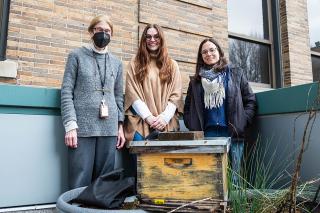As Associate Professor of Biology Anna Aguilera explains, pollination is crucial to the ecosystem. Through a partnership with Best Bees, Simmons faculty and students attain a better understanding of pollinators and their role in environmental sustainability.
What is the purpose and mission of Best Bees?
Best Bees is an excellent organization co-founded by Dr. Noah Wilson-Rich and Sean Cahill. This company sets up hives for private residences or businesses, and they do the bee tending and then bring honey and bee products to the folks that own those hives. This has really helped businesses who own the hives become more sustainable.
Best Bees also has an affiliate organization called The Urban Bee Lab. Not only are they beekeepers, but they do a lot of research on colony collapse — in other words, why we are losing bees. They have also engaged in pollinator research by studying honey DNA using next generation sequencing to determine which flowers were visited by bees to create that honey. Beyond honeybees, the Lab also researches native bees and monarch butterflies, and basically anything related to pollinator ecology and sustainability.
How did you get involved with Best Bees?
Noah Wilson-Rich used to teach at Simmons, and that's how I met him. Simmons became associated with Best Bees around 2013 and Simmons has a Best Bees hive. Dr. Jane Lopilato, Associate Professor and Chair of the Biology Department, is also involved.

How are Simmons students involved in Best Bees?
Amanda Burgess '23, a senior in the Biology Department, is doing her Capstone study on this project. In our new science building, Burgess and other researchers can isolate and amplify DNA from different pollinators. Many of these samples go to other labs for next generation sequencing, which can tell us what other organisms had contact with this flower.
I have other students working in the lab on environmental DNA techniques in which you sample your local environment by isolating and extracting DNA from specific organisms to ascertain which pollinator has visited which flower. We've partnered with Best Bees in this work, to look for honeybee DNA and native bee DNA on flowers.
The ultimate goal of this work is to have a better understanding of pollinator community dynamics. Pollination is a very important ecosystem service. There is a lot of work being done on environmental justice communities and the fact that they have less access to greenspaces, fewer canopy trees, and so forth. I think in the long term it would be interesting for Simmons students to study pollinators from an environmental justice perspective.
I talk about Best Bees in my courses dealing with ecosystem services and introduction to environmental science. It also comes up in my plant biology and ecology courses. Moreover, Best Bees takes beekeeping interns, which is wonderful. We have had a lot of Simmons students intern with Best Bees for their Capstone project.
Why is it important to improve bee health and expand the bee population?
Pollination is one of our most important ecosystem services. Without pollination, we don't have many of the food crops that we grow. As local agriculture becomes more critical in times of climate change, we want to have robust pollinator populations everywhere. To be sustainable, we need to protect pollinators.

